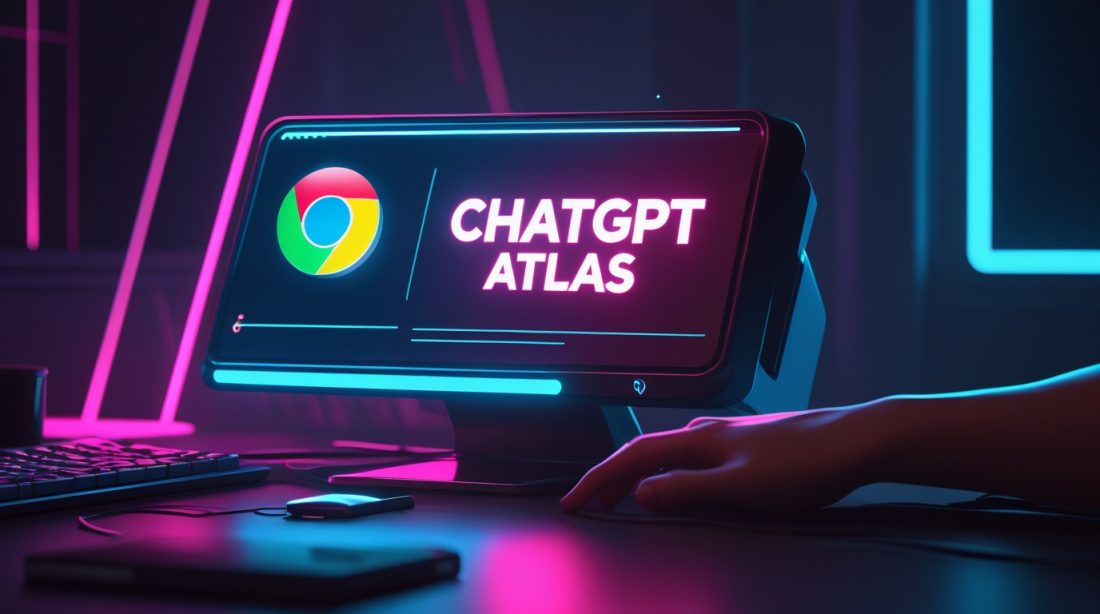The browser wars have reignited, and this time artificial intelligence is the battlefield.
OpenAI has launched ChatGPT Atlas, an AI-powered web browser that represents the company’s most direct challenge yet to Google’s dominance in how people find and interact with information online .
Announced on October 21, 2025, ChatGPT Atlas moves beyond traditional browsing by embedding OpenAI’s conversational AI directly into the browsing experience. The company describes it as “a browser built with ChatGPT at its core” .
“I used to switch between my slides and ChatGPT, taking screenshots just to ask a question,” said Yogya Kalra, a college student who participated in early testing. “Now ChatGPT instantly understands what I’m looking at, helping me improve my knowledge checks as I go” .
With this strategic move, OpenAI enters a market that has quickly become the AI industry’s next battleground, pitting them against established players like Google Chrome and Microsoft Edge, as well as AI-native competitors like Perplexity’s Comet browser. (Read more about how OpenAI is shifting toward robotics here).
Why ChatGPT Atlas Changes Web Browsing
ChatGPT Atlas represents a fundamental shift from traditional transaction-based browsing to an assistant-based model. Unlike conventional browsers where AI features are added extensions, Atlas is built from the ground up with ChatGPT integrated throughout the experience .
The browser launches initially on macOS, with support for Windows, iOS, and Android “coming soon” . It’s available to all free ChatGPT users at launch, with certain advanced features reserved for paid subscribers .
OpenAI CEO Sam Altman characterized this development as “a rare once-a-decade opportunity to rethink what a browser can be about” . This perspective highlights the transformative potential that OpenAI believes AI holds for reshaping our fundamental interactions with the digital world.
The timing of this launch is particularly significant, coming just months after a federal judge rejected calls to break up Google’s search monopoly partly because advancements in AI were already creating new competition .
How ChatGPT Atlas Capabilities Enhance User Productivity
1. Integrated ChatGPT Sidebar: Your Context-Aware Research Assistant
The ChatGPT sidebar appears alongside every webpage, automatically understanding the content you’re viewing. This eliminates the tedious copy-pasting of information between tabs that has characterized previous browsing experiences .
“You can ask ChatGPT questions like: ‘Find all the job postings I was looking at last week and create a summary of industry trends so I can prepare for interviews,'” explained OpenAI’s product team . This persistent AI companionship enables more fluid information gathering and analysis without disrupting your browsing flow.
2. Agent Mode: Delegating Routine Digital Tasks
The premium Agent Mode feature allows ChatGPT to perform tasks autonomously within your browser. This capability goes beyond simple information retrieval to actually taking actions on your behalf .
“Imagine you’re planning a dinner party and you have a recipe in mind,” suggested OpenAI’s documentation. “You can give the recipe to ChatGPT and ask it to find a grocery store, add all the ingredients to a cart, and order them to your house” .
During the launch livestream, Altman demonstrated how “It’s got all your stuff, it’s clicking around for you, you can watch it. You don’t have to, but it’s really—it’s using the internet for you” .
This agent functionality is currently available only to ChatGPT Plus, Pro, and Business users as a preview feature, acknowledging that it “may make mistakes on complex workflows” .
3. Browser Memories: Creating a Personalized AI Experience
Perhaps the most significant long-term feature is Browser Memories, which allows ChatGPT to remember context from websites you visit and apply that knowledge to future interactions .
This creates a browsing experience that becomes more personalized and useful over time. Atlas can recall your previous activities and preferences to provide more relevant assistance .
Privacy controls are integral to this feature—you can view, archive, or delete browser memories at any time, and specific sites can be excluded from memory collection using a toggle in the address bar .
Why Industrial Analysis Matters for ChatGPT Atlas Adoption
Competitive Landscape Reshuffling
The launch of ChatGPT Atlas signals a new phase in the browser wars, with AI integration becoming the primary battlefield rather than traditional metrics like rendering speed or extension ecosystems .
The market impact was immediate, with shares of Alphabet, Google’s parent company, closing down 2% following OpenAI’s announcement . This financial reaction underscores how seriously investors take this competitive threat to Google’s core business.
According to TechCrunch, “browsers have quickly become the AI industry’s next battleground” . While Google Chrome has long dominated with more than 3 billion users worldwide, there’s growing recognition that “AI chatbots and agents are fundamentally changing how people get work done online” .
Challenges in Browser Market Penetration
Despite the excitement in tech circles, OpenAI faces a daunting challenge in disrupting Chrome’s dominance. As one analyst noted, it will be extremely difficult “competing with a giant who has ridiculous market share”. (A recent example is the Sora deepfake ethics controversy covered here)
This isn’t the first time a well-funded challenger has attempted to dethrone a browsing giant. When Google released Chrome in 2008, Microsoft’s Internet Explorer was similarly dominant, yet Chrome eventually prevailed through superior speed and user experience .
OpenAI hopes to replicate this disruption through AI-native integration rather than incremental improvements.
Industrial Implications of AI-First Browsing
The industrial analysis of Atlas must consider how it might change traffic patterns for online businesses. If ChatGPT effectively summarizes information from websites, users might visit fewer pages, potentially impacting online publishers who rely on page views for advertising revenue .
This concern was highlighted in the Associated Press coverage, which noted this technology “could also further cut off the lifeblood of online publishers if ChatGPT so effectively feeds people summarized information that they stop exploring the internet and clicking on traditional web links” .
What Industry Experts Say About ChatGPT Atlas
During the announcement livestream, OpenAI’s Engineering Lead for Atlas, Ben Goodger, explained that “ChatGPT is core to the company’s first browser” . This emphasis on AI as fundamental rather than additive distinguishes Atlas from AI features being added to existing browsers.
OpenAI’s Product Lead, Adam Fry, highlighted how the integrated experience eliminates friction: “Since ChatGPT will follow users across the web with Atlas, there is no need to copy and paste between tabs” .
Not all reactions have been uniformly positive. Paddy Harrington, an analyst at market research group Forrester, expressed concerns about the personalization aspects, asking: “But is it really you, really what you’re thinking, or what that engine decides it’s going to do? … And will it add in preferred solutions based on ads?” .
Safety Considerations for AI Browser Agents
As with any autonomous system, Agent Mode introduces novel security considerations. OpenAI has implemented several safeguards to address risks that come from “access to logged-in sites and browsing history while taking actions on your behalf” .
These safeguards include preventing the agent from running code in the browser, downloading files, or installing extensions. The system will also “pause to ensure you’re watching it take actions on specific sensitive sites such as financial institutions” .
OpenAI acknowledges that “ChatGPT’s agent capabilities still carry risk” beyond simple mistakes, including susceptibility to “hidden malicious instructions” that might be embedded in webpages or emails . Users are advised to monitor agent activities, especially when dealing with sensitive information.
The Future of AI-Powered Browsing
OpenAI has signaled that this is just the beginning for ChatGPT Atlas. The company’s roadmap includes “multi-profile support, improved developer tools, and ways Apps SDK developers can increase discoverability of their apps in Atlas” .
Website owners can optimize how ChatGPT Agent interacts with their sites by adding ARIA tags, suggesting a future where sites are designed specifically for AI browsing as well as human browsing .
As one industry observer noted, “This launch marks a step toward a future where most web use happens through agentic systems—where you can delegate the routine and stay focused on what matters most” .
FAQ: Common Questions About ChatGPT Atlas
Is ChatGPT Atlas available for Windows?
How much does ChatGPT Atlas cost?
What makes ChatGPT Atlas different from using ChatGPT alongside a traditional browser?
Fast Facts
- OpenAI launched ChatGPT Atlas, an AI-powered browser with built-in ChatGPT integration
- Key features include a context-aware sidebar, task-automating Agent Mode, and personalized Browser Memories
- Initially available on macOS, with Windows, iOS, and Android versions coming soon
- Challenges Google’s browsing dominance while raising questions about AI’s impact on web traffic patterns
- Free to use with advanced features reserved for paid subscribers
Stay Ahead of Industry AI Trends
Want more analysis of how AI is transforming digital experiences? Subscribe to our newsletter for weekly insights on AI developments and their industrial impact.
This analysis is based on official OpenAI announcements and multiple industry reports. Features and availability may change as the product develops.
Related Reading

